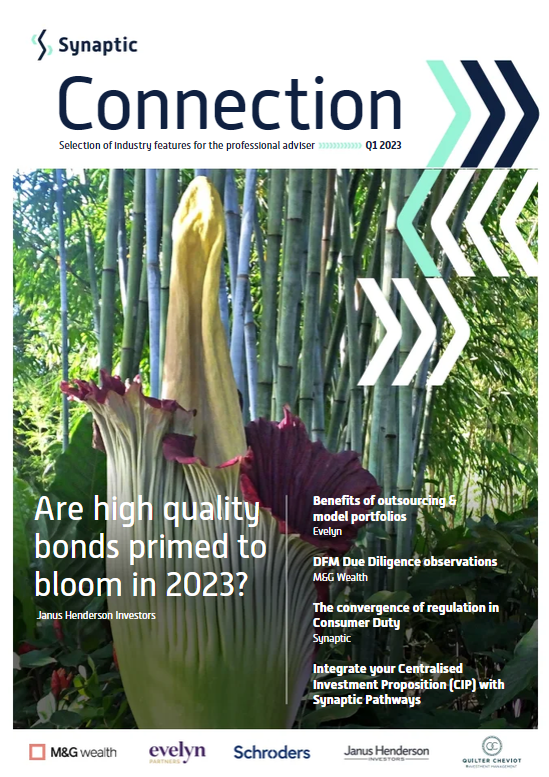In this edition...
- What we know – and what we don’t Patrick Farrell, Chief Investment Officer and Head of Research - Charles Stanley
- Regime shift: five seismic adjustments taking place in the global economy Azad Zangana, Senior European Economist and Strategist - Schroders
- How to navigate a recession Mike Coop, Morningstar Investment Management - EMEA
- High quality bonds are primed to bloom in 2023 John Pattullo, Co-Head of Global Bonds- Janus Henderson
- Fixed Income - Research Matters Andrew Metcalf, Fixed Income Portfolio Manager - Close Brothers Asset Management
- From 'TINA to 'TANIA'... Bryn Jones, Head of Fixed Income - Rathbones
- The RSMR Broadcast: How impactful is investment management outsourcing? Scott McNiven, MPS Accounts Manager - RSMR
- Hours to minutes Synaptic,
- Benefits of outsourcing and model portfolios Evelyn & Partners,
- DFM Due Diligence – some observations Sean Hawkins, Head of Business Development - M&G Wealth Investments
- 2022 – The death knell for the 60/40 approach to investing? John Husselbee, Head of Multi-Asset - Liontrust
- Why ‘nature positive’ will be as big as net zero Jenn-Hui Tan, Global Head of Stewardship & Sustainable Investing - Fidelity International
- The rise of the female investor Vanessa Eve, Investment Manager - Quilter Cheviot
- Integrate your Centralised Investment Proposition (CIP) with Synaptic Pathways Eric Armstrong, Client Director - Synaptic
- The convergence of regulation in Consumer Duty Eric Armstrong, Client Director, Synaptic
- Tackle Consumer Duty with the new Synaptic integration Alan Lakey , Director - CIExpert & Highclere Financial Services Ltd
 The conveyor belt of regulatory change over the last decade has delivered lots of things - some good, some bad and some unexpected. There’s definitely been more acronyms entering the already crowded lexicon of financial services!
The conveyor belt of regulatory change over the last decade has delivered lots of things - some good, some bad and some unexpected. There’s definitely been more acronyms entering the already crowded lexicon of financial services!
There’s also been more focus on adviser research and selection processes and how they do it. Central to this has been the rise of the ‘Due Diligence’ process, which at the very least provides advisers with the opportunity to ‘show their workings’ on how they’ve populated their Central Investment Proposition, or CIP.
As a discretionary manager, we see and participate in lots of these processes. It certainly doesn’t make me a compliance or research expert but it does give a decent birds eye view of what goes on. Rather than boring you with an exhaustive list of everything that could possibly be considered in the process, I thought I would share some of my thoughts about a handful of areas that appear to be underserved in the process or could be developed more.
• Initial filtering – there are a huge number of MPS providers out there so without applying any parameters, the due diligence process will pull in huge amounts of data. That data then needs to be processed and refined which all takes time and resource to do and can often raise more questions than answers. There’s also the risk that with such a large volume of data it becomes difficult to see the wood from the trees and you potentially end up doing nothing or making decisions based on singular stand out features, such as the cheapest or best performing historically, rather than something more broadly suitable for your needs. Some up front filtering, whether that’s driven by client segmentation, investment philosophy, cost parameters, performance or anything else that really matters to you will help pare down the due diligence to a more manageable size and focus on what really matters to you and your clients. With less, more relevant data, logically it should improve the decision making process.
• Asset allocation – we rarely get asked explicitly about our asset allocation approach and process. It’s pretty well accepted that asset allocation is the single biggest driver of returns in a portfolio so it always surprises me it’s not questioned directly in these processes. Given the number of ‘black swan’ events that have occurred in recent years, it’s more important than ever to understand how investment managers are making the big decisions.
The different approaches here can have significant impacts in the way the propositions operate: Is their asset allocation process backward looking or forward looking? Do they do it themselves or outsource to a third party? What resource and expertise do they have to do this? Is their approach static or dynamic? Is there any tactical flexibility?
There’s no right or wrong answers per se, and each DFM will be able to articulate why they believe in their approach so you will need to apply some subjective judgement on what works for your business. For example, if your investment philosophy is such that you believe your investment manager should be able to react tactically to changes in market conditions then a solution based on a static asset allocation probably isn’t for you.
• Access and visibility of key people – desk-based research is undoubtedly important and we did make it through the Covid pandemic with video calls. But I’ve always been a big believer that meeting the people within a business gives you an unparalleled insight into what they do and how they do it. At the very least, it gives you a view on whether you can form a meaningful working relationship with them. This is particularly important when it comes to the people actually managing your client’s money. I think this is a vital part of the process and allows you to explore any nuances of the proposition and how they run the portfolios.
• Platform limitations – this one is particularly close to my heart as I spent over a decade working in the platform world and experienced first-hand the growth of outsourcing and MPS, as well as the technology that goes with it. Most questions we receive on platforms are based around what platforms our models are available on. In a perfect world, this should be the only question that needs answering. My belief has always been that platforms should be a neutral enabler of advisers’ investment proposition (whether they run it themselves or outsource) rather than the platforms limitations defining what the investment proposition is.
Whilst great strides have been made by platforms in this regard, most DFMs will share with you the challenges of asset availability, dealing fees, wrapper restrictions, trade implementation time-frames, etc - all of which potentially impact what goes into their model portfolios and the outcomes clients experience. So, as part of your DFM due diligence process, it’s worth understanding not just on what platforms models are available on, but whether there are any limitations or alterations the platform creates. At its most extreme, we’ve withdrawn models from a platform because we weren’t able to get access to the funds we wanted (or even substitutes for them) and thus were unable to get anywhere near the investment strategy we wanted to deliver.
Looking ahead, Consumer Duty will reinforce the importance of robust and effective due diligence processes. It will also create some specific areas to be investigated. So with not long to go, it’s worth thinking about what you need to support your policies and procedures.
"Consumer Duty will reinforce the importance of robust and effective due diligence processes. It will also create some specific areas to be investigated. So with not long to go, it’s worth thinking about what you need to support your policies and procedures."
Get in touch
Please get in touch if you’d like to find out more about the M&G Wealth Investment MPS or to discuss your due diligence requirements.
www.mandg.com/wealth/adviser-services/investment-solutions/mps
sean.hawkins@mandg.com
Sign up for updates
Keep up to speed with everything you need to know each quarter, by email or post.


